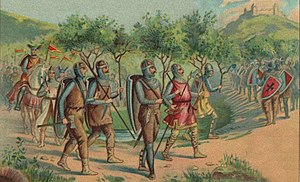
Year 584 (DLXXXIV) was a leap year starting on Saturday of the Julian calendar. The denomination 584 for this year has been used since the early medieval period, when the Anno Domini calendar era became the prevalent method in Europe for naming years.

Year 597 (DXCVII) was a common year starting on Tuesday of the Julian calendar. The denomination 597 for this year has been used since the early medieval period, when the Anno Domini calendar era became the prevalent method in Europe for naming years.

Year 613 (DCXIII) was a common year starting on Monday of the Julian calendar. The denomination 613 for this year has been used since the early medieval period, when the Anno Domini calendar era became the prevalent method in Europe for naming years.

Austrasia was a territory which formed the north-eastern section of the Kingdom of the Franks from the 6th to 8th centuries, ruled by the Frankish Merovingian and Carolingian dynasties during the Early Middle Ages. It was centred on the Meuse, Middle Rhine, and the Moselle rivers, and was the original territory of the Franks, including both the so-called Salian Franks and Ripuarian Franks, which Clovis I, King of the Franks (481–511) conquered after first taking control of the bordering part of Roman Gaul, which is sometimes described in this period as Neustria.

Chlothar II, sometimes called "the Young", was king of the Franks, ruling Neustria (584–629), Burgundy (613–629) and Austrasia (613–623).

Neustria was the western part of the Kingdom of the Franks during the Early Middle Ages, in contrast to the eastern Frankish kingdom, Austrasia. It initially included land between the Loire and the Silva Carbonaria, in the north of present-day France, with Paris, Orléans, Tours, Soissons as its main cities. The population was therefore originally largely Romanised.

Brunhild, also known as Brunhilda or Brynhild, is a female character from Germanic heroic legend. She may have her origins in the Visigothic princess and queen Brunhilda of Austrasia.
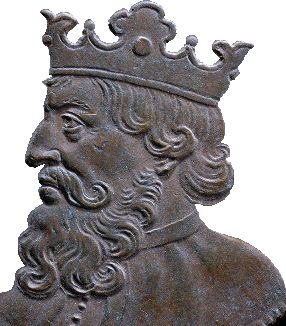
Chilperic I was the king of Neustria from 561 to his death. He was one of the sons of the Frankish king Clotaire I and Queen Aregund.

Childebert II (c.570–596) was the Merovingian king of Austrasia from 575 until his death in March 596, and the king of Burgundy from 592 to his death, as the adopted son of his uncle Guntram.

Shelley Winters was an American film actress whose career spanned seven decades. She won Academy Awards for The Diary of Anne Frank (1959) and A Patch of Blue (1965), and received nominations for A Place in the Sun (1951) and The Poseidon Adventure (1972). She also appeared in A Double Life (1947), The Night of the Hunter (1955), Lolita (1962), Alfie (1966), Next Stop, Greenwich Village (1976), and Pete's Dragon (1977). In addition to film, Winters appeared in television, including a tenure on the sitcom Roseanne, and wrote three autobiographical books.
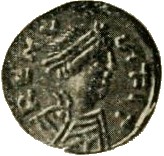
Sigebert I was a Frankish king of Austrasia from the death of his father in 561 to his own death. He was the third surviving son out of four of Clotaire I and Ingund. His reign found him mostly occupied with a successful civil war against his half-brother, Chilperic.

Galswintha (540–568) was a queen consort of Neustria. She was the daughter of Athanagild, Visigothic king of Hispania, and Goiswintha. Galswintha was the sister of Brunhilda, Queen of Austrasia; and the wife of Chilperic I, the Merovingian king of Neustria. Galswintha was likely murdered at the urging of Chilperic's former concubine Fredegund, instigating a 40-year civil war within the Merovingian kingdom.
Fredegund or Fredegunda was the queen consort of Chilperic I, the Merovingian Frankish king of Soissons. Fredegund served as regent during the minority of her son Chlothar II from 584 until 597.
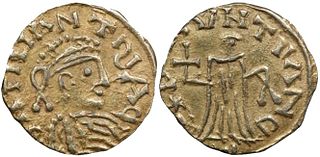
Saint Gontrand, also called Gontran, Gontram, Guntram, Gunthram, Gunthchramn, and Guntramnus, was the king of the Kingdom of Orléans from AD 561 to AD 592. He was the third-eldest and second-eldest-surviving son of Chlothar I and Ingunda. On his father's death in 561, he became king of a fourth of the Kingdom of the Franks, and made his capital at Orléans. The name "Gontrand" denotes "War Raven".
Brunhilda was queen consort of Austrasia, part of Francia, by marriage to the Merovingian king Sigebert I of Austrasia, and regent for her son, grandson and great-grandson.
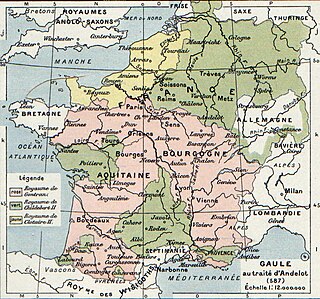
Theuderic II (587–613), king of Burgundy (595–613) and Austrasia (612–613), was the second son of Childebert II. At his father's death in 595, he received Guntram's kingdom of Burgundy, with its capital at Orléans, while his elder brother, Theudebert II, received their father's kingdom of Austrasia, with its capital at Metz. He also received the lordship of the cities (civitates) of Toulouse, Agen, Nantes, Angers, Saintes, Angoulême, Périgueux, Blois, Chartres, and Le Mans. During his minority, and later, he reigned under the guidance of his grandmother Brunhilda, evicted from Austrasia by his brother Theudebert II.
Basina, was a Frankish princess, the daughter and youngest child of Chilperic I, King of Soissons, and his first wife, Audovera. After surviving the assassination of her immediate family, she became a nun. She later helped to lead a rebellion by a group of the nuns, which became a scandal throughout the region. This event was chronicled by the bishop and saint, Gregory of Tours, who was one of the bishops chosen to settle the matter.
Landric was the mayor of the palace of Neustria. According to the Vita Aldegundis, he and his probable brother Gundoland were uncles of Saint Aldegunda. The chief sources for his reign are the Chronicle of Fredegar and the Liber Historiae Francorum.

Audovera was the first wife or mistress of Chilperic I, king of Neustria.
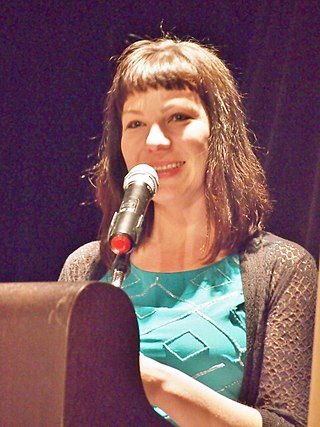
Shelley Puhak is an American poet and writer. She was Eichner Professor of Creative Writing at Notre Dame of Maryland University. She won the Anthony Hecht Poetry Prize for her poetry collection Guinevere in Baltimore. She was a National Poetry Series winner for her poetry collection Harbinger She is also the author of The Dark Queens: The Bloody Rivalry That Forged the Medieval World, a double biography.
